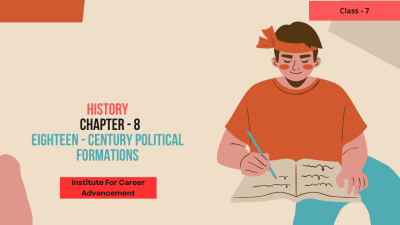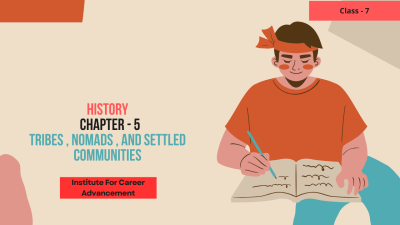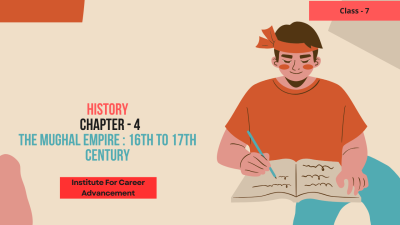Courses


 Compare
Compare
Our Changing Earth - Class 7 is a course that explores the Earth's dynamic processes and how they have shaped the planet over millions of years. It covers topics such as erosion, weathering, sedimentation, and the formation of landforms. আমাদের পরিবর্তনশীল পৃথিবী-ক্লাস 7 এমন একটি কোর্স যা পৃথিবীর গতিশীল প্রক্রিয়াগুলি এবং কীভাবে তারা লক্ষ লক্ষ বছর ধরে গ্রহটিকে আকৃতি দিয়েছে তা অন্বেষণ করে। এটি ক্ষয়, আবহাওয়া, অবক্ষেপ এবং ভূমিরূপ গঠনের মতো বিষয়গুলিকে অন্তর্ভুক্ত করে।
1 Lessons
Hours

 Compare
Compare
Eighteen-Century Political Formations is a course that explores the political developments and structures that emerged in the 18th century. It examines the rise of nation-states, the formation of empires, and the changing nature of political power and governance during this period. অষ্টাদশ শতাব্দীর রাজনৈতিক গঠন হল এমন একটি কোর্স যা অষ্টাদশ শতাব্দীতে উদ্ভূত রাজনৈতিক উন্নয়ন এবং কাঠামোর অন্বেষণ করে। এটি এই সময়কালে জাতি-রাষ্ট্রের উত্থান, সাম্রাজ্যের গঠন এবং রাজনৈতিক ক্ষমতা ও শাসনের পরিবর্তিত প্রকৃতি পরীক্ষা করে।
0 Lessons
Hours

 Compare
Compare
The Making of Regional Cultures is a course that explores the factors that shape regional cultures and how these cultures have evolved over time. It delves into the influence of geography, history, language, religion, and social interactions in creating unique regional identities. আঞ্চলিক সংস্কৃতি তৈরি একটি কোর্স যা আঞ্চলিক সংস্কৃতিকে রূপদানকারী কারণগুলি এবং সময়ের সাথে সাথে এই সংস্কৃতিগুলি কীভাবে বিবর্তিত হয়েছে তা অনুসন্ধান করে। এটি অনন্য আঞ্চলিক পরিচয় তৈরিতে ভূগোল, ইতিহাস, ভাষা, ধর্ম এবং সামাজিক মিথস্ক্রিয়ার প্রভাব অনুসন্ধান করে।
1 Lessons
Hours

 Compare
Compare
Devotional Paths to the Divine is a course that explores the various ways people express their spirituality and connect with the divine. It delves into different religious traditions, beliefs, and practices, promoting understanding and tolerance. ঐশ্বরিকতার প্রতি ভক্তিমূলক পথ হল এমন একটি পথ যা বিভিন্ন উপায়ে মানুষ তাদের আধ্যাত্মিকতা প্রকাশ করে এবং ঐশ্বরিকের সাথে সংযোগ স্থাপন করে। এটি বিভিন্ন ধর্মীয় ঐতিহ্য, বিশ্বাস এবং অনুশীলনের উপর আলোকপাত করে, বোঝাপড়া এবং সহনশীলতার প্রচার করে।
1 Lessons
Hours

 Compare
Compare
Tribes, Nomads, and Settled Communities is a course that explores the diverse ways people have organized themselves throughout history. It examines the lifestyles, cultures, and challenges faced by tribal societies, nomadic groups, and settled communities. উপজাতি, যাযাবর এবং বসতি স্থাপনকারী সম্প্রদায়গুলি এমন একটি কোর্স যা ইতিহাস জুড়ে মানুষ নিজেদের সংগঠিত করার বিভিন্ন উপায়গুলি অন্বেষণ করে। এটি উপজাতীয় সমাজ, যাযাবর গোষ্ঠী এবং বসতি স্থাপনকারী সম্প্রদায়ের জীবনধারা, সংস্কৃতি এবং চ্যালেঞ্জগুলি পরীক্ষা করে।
0 Lessons
Hours

 Compare
Compare
The Mughal Empire: 16th to 17th Century is a course that explores the history of the Mughal Empire, one of the most influential empires in India. It delves into the rise and fall of the Mughal dynasty, their cultural contributions, and their impact on the region. মুঘল সাম্রাজ্যঃ 16শ থেকে 17শ শতাব্দী হল এমন একটি কোর্স যা ভারতের অন্যতম প্রভাবশালী সাম্রাজ্য মুঘল সাম্রাজ্যের ইতিহাস অন্বেষণ করে। এটি মুঘল রাজবংশের উত্থান ও পতন, তাদের সাংস্কৃতিক অবদান এবং এই অঞ্চলে তাদের প্রভাব সম্পর্কে আলোকপাত করে।
1 Lessons
Hours

 Compare
Compare
Delhi: 12th to 15th Century is a course that explores the history of Delhi during this period, focusing on the rise and fall of various dynasties and their impact on the city's development. It delves into the cultural, political, and economic changes that shaped Delhi during this time. দিল্লিঃ দ্বাদশ থেকে পঞ্চদশ শতাব্দী এমন একটি কোর্স যা এই সময়ের দিল্লির ইতিহাস অন্বেষণ করে, বিভিন্ন রাজবংশের উত্থান ও পতন এবং শহরের উন্নয়নে তাদের প্রভাবের উপর দৃষ্টি নিবদ্ধ করে। এটি এই সময়ে দিল্লিকে রূপদানকারী সাংস্কৃতিক, রাজনৈতিক এবং অর্থনৈতিক পরিবর্তনগুলির উপর আলোকপাত করে।
0 Lessons
Hours

 Compare
Compare
Introduction: Tracing Changes Through a Thousand Years is a course designed to introduce students to the concept of history and the ways in which historians study the past. It explores the methods used to trace changes over time, including evidence, sources, and interpretations. ভূমিকাঃ হাজার বছরের মধ্যে পরিবর্তনের সন্ধান একটি কোর্স যা শিক্ষার্থীদের ইতিহাসের ধারণা এবং ইতিহাসবিদদের অতীত অধ্যয়নের উপায়গুলির সাথে পরিচয় করিয়ে দেওয়ার জন্য ডিজাইন করা হয়েছে। এটি প্রমাণ, উৎস এবং ব্যাখ্যা সহ সময়ের সাথে সাথে পরিবর্তনগুলি সনাক্ত করতে ব্যবহৃত পদ্ধতিগুলি অন্বেষণ করে।
0 Lessons
Hours

 Compare
Compare
The Mughal Empire, (Persian language: مغل بادشاۿ) was an empire that at its greatest territorial extent ruled parts of Afghanistan, Balochistan and most of the Indian Subcontinent between 1526 and 1857. The empire was founded by the Mongol leader Babur in 1526, when he defeated Ibrahim Lodi, the last of the Afghan Lodi Sultans at the First Battle of Panipat, where they used gunpowder for the first time in India. The Mughal Empire is known as a “gunpowder empire.” The word "Mughal" is the Indo-Aryan version of "Mongol." Babur was a descendant of Chingis Khan. The Mughals retained aspects of Mongol culture well into the sixteenth century, such as the arrangement of tents around the royal camp during military maneuvers. The religion of Mughals was Islam. মুঘল সাম্রাজ্য, (ফার্সি ভাষা: مغل بادشاه) ছিল একটি সাম্রাজ্য যেটি 1526 থেকে 1857 সালের মধ্যে আফগানিস্তান, বেলুচিস্তান এবং ভারতীয় উপমহাদেশের বেশিরভাগ অংশ শাসন করেছিল। সাম্রাজ্যটি 1526 সালে মঙ্গোল নেতা বাবর দ্বারা প্রতিষ্ঠিত হয়েছিল, যখন তিনি পানিপথের প্রথম যুদ্ধে আফগান লোদি সুলতানদের শেষ ইব্রাহিম লোদিকে পরাজিত করেন, যেখানে তারা ভারতে প্রথমবার বারুদ ব্যবহার করে। মুঘল সাম্রাজ্য একটি "গানপাউডার সাম্রাজ্য" হিসাবে পরিচিত। "মুঘল" শব্দটি "মঙ্গোল" এর ইন্দো-আর্য সংস্করণ। বাবর ছিলেন চিঙ্গিস খানের বংশধর। মুঘলরা ষোড়শ শতাব্দীতে মঙ্গোল সংস্কৃতির দিকগুলো ভালোভাবে ধরে রেখেছিল, যেমন সামরিক কৌশলের সময় রাজকীয় শিবিরের চারপাশে তাঁবুর ব্যবস্থা। মুঘলদের ধর্ম ছিল ইসলাম।
4 Lessons
00:10:00 Hours